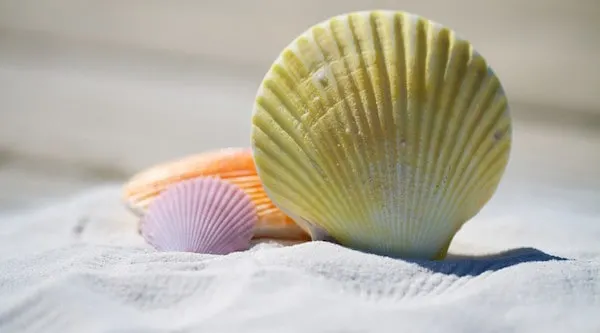If you want to bring home souvenirs from the beach holidays, you should be very careful. Many of the magnificent things you will find on the beach are either not allowed to be imported (into the EU), or only with the appropriate documents.
Can I bring home Sand and Mussels from my Holidays?
As a rule, sand must NOT be brought home from the holidays. Many countries and islands now prohibit the export of sand completely. In Sardinia, for example, tourists who steal sand are punished with a fine of 500 to 3000 euros. Even smaller amounts of sand are taboo. You must therefore also do without a small bottle of sand as a travel souvenir. Background for this is, on the one hand, the scarcity of resources of sand and, on the other hand, there are also import bans for sand since the sand could be infested by pests.
Mussels are protected under the Washington Convention on International Trade in Endangered Species of Wild Fauna and Flora (CITES). The import and export of bivalve molluscs requires species protection documents, also if intended for personal, non-commercial use. Accordingly, you may not simply take home mussels that you have found on the beach (or elsewhere). However, there are a few exceptions. One of those exceptions concerns giant clams: According to EU Customs, a person may import up to three specimens of giant clams for personal use in personal luggage without documentation.
Please note that this exception only applies to dead specimens. Living specimens are excluded from this exception.
However, in any case, you must first check whether you are allowed to export these clams at all. Depending on the country, there may also be export bans.
Other problematic souvenirs
Sand and mussels are a no-go and should generally not be imported. We all know that by know (if you don’t, please read the article from the beginning). But you also need to be careful with many other souvenirs – not only with Beach Souvenirs. Many plants and animals, as well as their parts and products, are protected under the Washington Convention on International Trade in Endangered Species of Wild Fauna and Flora (CITES).
Whether and under what conditions the objects that are protected may be imported into or exported from the EU depends on whether the objects are listed in one of the three Appendices (I, II or III) of the Convention or not. You can find out more about this on the CITES website.
There are some exceptions for some of the CITES specimens. Those exceptions are valid for the whole EU. You will find those exceptions (for instance for giant clams, as we have seen earlier in this article) here under Point 28
Have a look at our recent article on forbidden travel souvenirs: “These 8 souvenirs will get you in trouble. Guaranteed“. In this article, we have compiled some bizarre, curious and prickly souvenirs for you, which you better keep your hands off. Because an illegal import can cost you dearly with these souvenirs or in the worst case even put you behind bars.
As absurd as it may seem at first glance, even desert regions now import vast amounts of sand.
The background to this is the fact that sand is increasingly becoming a scarce resource. Because sand is much more than just something on which you lay your towel on the beach and watch your children build a pretty sandcastle.
The mega-cities of our world are built with sand, because concrete, the foundation for the construction of skyscrapers, bridges, airports and many other buildings, consists to a large extent of sand.
And so it is no longer surprising that sand is in very high demand. And scarce resources are known to be expensive. In other words, a lot of money can be earned with sand.
Accordingly, sand is transported away in large quantities from beaches, or torn away (sometimes illegally by sand mafias), to serve as a raw material, for example, for the construction of buildings. But not only the construction of buildings requires sand. Glasses, plastic and many other materials also need sand.
Customs apps make your life easier
Admittedly, it is not always easy to keep track of which travel souvenirs may or may not be imported. This is where Customs Apps can come in very handy. For instance, Switzerland and Germany have such neat apps that let you check what goods (souvenirs) you can import legally (and tax-free)
Unfortunately, the UK does not (yet) have such an app. If you would like to know more about UK Customs Allowances, you will find all the important info here: UK Customs Allowances
The App from German Customs: Zoll & Reise (Customs & Travel)
The app on the Google Play Store
The app in the App Store (Apple)
If you are unsure which goods and how much of them you are allowed to import into Germany and what you have to pay attention to, then the app “Zoll & Reise” (Customs & Travel) of the German Customs is exactly the right thing for you.
The useful app offers you the following useful functions:
- Find out which goods are permitted when entering Germany
- Easily found out what to consider when importing the different goods
- Information on which goods may be imported duty-free
- Information on the costs incurred if the allowed exempt quantity is exceeded
- With the new assistant, you can easily find out how high the expected import duties are. This enables you to assess better whether or not it is worth buying specific goods abroad.
This App is unfortunately only available in German.
This App might also be interesting for you if you are living in another EU-Country than Germany because Customs Allowances are uniform in the EU.
The App from Swiss Customs: Reise & Waren (Travel & Goods)
The App on the Google Play Store
The App in the App Store (Apple)
The Swiss customs app is modern, easy to use and extremely practical. The app is also available in four language versions: German, French, Italian and English.
Of course, an app must not only meet customers’ expectations regarding language coverage but also be convincing regarding functions.
The Swiss Customs App includes:
- Entry requirements, passport, visa, customs procedure
- Purchase abroad (exempt quantities), value limit, alcohol, tobacco and foodstuffs
- Rules when crossing the border with animals and plants
- Rules when crossing the border in a vehicle
- Prohibitions, restrictions (counterfeiting, souvenirs, medicines, etc.)

Hey guys! It’s me, Marcel. I am the proud owner of carry-on-baggage.com. I am dealing with hand luggage related issues on a daily basis and I own several websites in this niche. Travelling is one of my biggest passions in life and I, therefore, happen to know a thing or two about hand luggage. I hope you all have a safe trip! Take care and thanks for the support. I really appreciate it.
